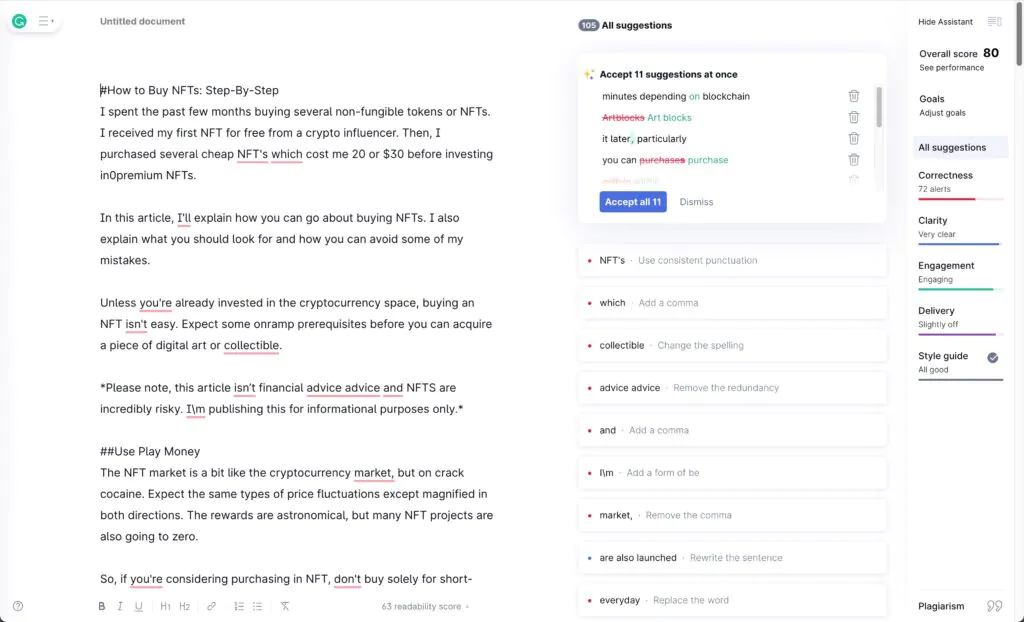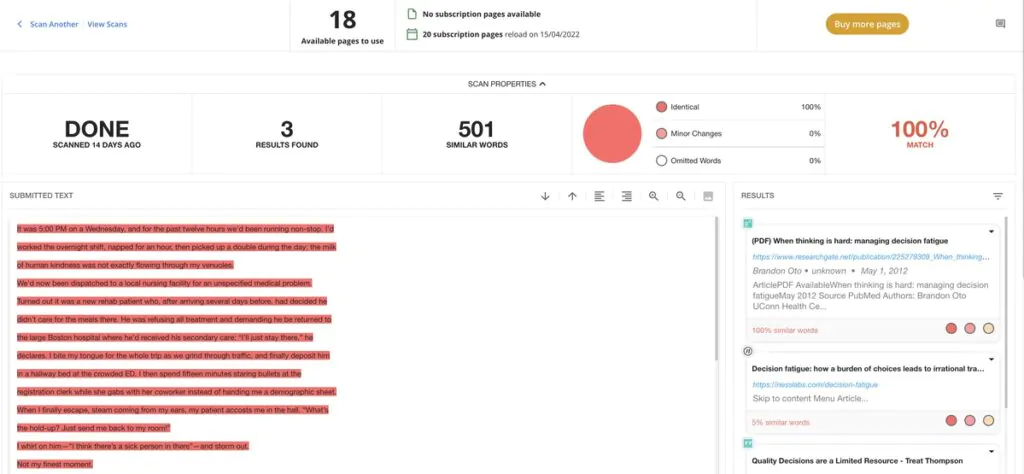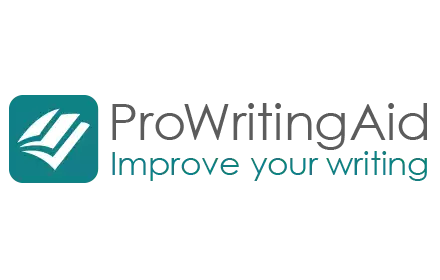Discover what to expect from the best plagiarism software for thesis.
Several years ago, I completed a postgraduate degree. My tutor underlined the importance of consulting a range of primary and secondary sources with correct citations. I spent almost as much time checking my citations and references as I did writing the first draft! Thankfully, students can save significant time on this part of thesis writing using plagiarism software.
Turnitin is the most popular plagiarism software in academia, but not every student has access. It’s not freely available online either, but a workaround exists. I’ve spent dozens of hours testing and using popular plagiarism tools. I use them to check blog posts, articles, books, essays and technical papers. In this article, I profile the best plagiarism tools for your thesis.
Contents
Top 8 Plagiarism Software for Thesis
1. Scribbr
Use for: accessing Turnitin
Pricing: $19.95 to check 7,500 words

Turnitin is the number one plagiarism tool used by academic assessors. If you have access to this tool, stick with it. Unfortunately, TurnItIn isn’t widely available outside of academia. Enter Scribbr. It’s powered by Turnitin and scans web pages and over eight million publications. That sets it apart from other tools here. Our reviewer found Scribbr easy to use, insightful and relatively accurate. It also includes a citation generator. It’s ideal for checking a thesis for plagiarism.
To learn more, read our Scribbr review.
2. Quetext
Use for: deep academic plagiarism searches
Price: From $14.99 per month for 200 pages

QueText is aimed at teachers, academics and general writers. Like Scribbr, it checks for plagiarism against web content and online textbooks.
QueText’s key selling point for thesis writers is its DeepSearch technology, which checks against gated content. It took us about two minutes to review a 754-word essay extract, which is somewhat slower than other tools. Interestingly, this DeepSearch feature found references to our essay on Twitter and web.archive.org. Some of the other tools featured here didn’t check these sources.
QueText also supports multiple languages, including Spanish, French, Polish, German, and Dutch. It also includes a citation assistant. Thesis writers can check up to 500 words for free once they sign up.
Read our QueText review to learn more.
3. Grammarly
Use for: general plagiarism and grammar checks
Pricing: $30 per month

Grammarly Premium excels as plagiarism software. It’s ideal for most students and thesis writers, with some caveats.
Grammarly’s strength is it works across platforms and devices, including Windows and Mac, and browsers like Chrome, Firefox and Safari. I regularly use the Gmail, Chrome extension and Google Docs plugin to run plagiarism checks on articles and essays.
However, thesis writers must use Grammarly Premium, as the free version doesn’t include plagiarism checks. It took us about 20 seconds to check 754 words. You’ll need to paste or upload each chapter rather than the entirety of your thesis.
Grammarly only checks against articles freely available online. So, don’t expect it to check your work against gated academic papers. It also lacks a dedicated citation manager. The grammar checker excels, though.
To learn more, read our Grammarly review.
We tested dozens of grammar checkers, and Grammarly is the best tool on the market today. It'll help you write and edit your work much faster. Grammarly provides a powerful AI writing assistant and plagiarism checker.
4. Quillbot
Use for: Plagiarism checks, building a bibliography, managing citations
Pricing: $19.95 per month, $7.45 per page
Quillbot is an excellent all-around academic writing tool.

Creating a good reference and bibliography for a thesis is key if you want to avoid accusations of plagiarism. We liked Quillbot’s citation generator as it saved us time creating these for a paper.
This generator formats any link, document or reference based on a student’s preferred style and generates the correct citation. Quillbot customers also get access to other premium tools for rewriting and summarizing. Remember to cite your sources, though!
The plagiarism checker works similarly to Grammarly, except it’s billed per page. A page is approximately 300 words, and 25 pages cost $7.45, with discounts available. It’d cost $25–50 to check a thesis of average length (say 35,000 words). It took us about two minutes to check 754 words. The accuracy was on par with Grammarly but not as deep as QueText.
5. ProWritingAid
Use for: Basic plagiarism and grammar checks
Pricing: $70 per year; plagiarism reports start at $10 for ten checks.

ProWritingAid is an excellent alternative to Grammarly for fixing grammar issues in a thesis. However, it’s less useful as an academic plagiarism checker. Firstly, it’s slower to use than the tools above. Secondly, in our tests, ProWritingAid missed some instances of plagiarism that other devices caught. Billing for plagiarism checks is also somewhat confusing.
To learn more, read our ProWritingAid review.
ProWritingAid is a powerful, accurate grammar checker and style editor. It's suitable for non-fiction and fiction writers and doesn't require a monthly subscription. Save 20% per month or year.
6. Copyscape
Use for: plagiarism checks for online content, on a per-page basis
Pricing: 3 cents per search, up to 200 words

Copyscape isn’t a purpose-built plagiarism tool for a thesis writer, but we’d be remiss to exclude it. It scans text for instances of plagiarism, accidental or otherwise. It doesn’t require a monthly subscription. A $100 in credits is more than enough to check any thesis, as these last a year.
Like other tools, it only scans against content freely available online. It’s great for sourcing missing citations and cheaper than Grammarly. Don’t expect it to dig behind academic paywalls, though.
To learn more, read our Copyscape review.
7. PaperRater
Use for: checking essays and college submissions on a budget
Pricing: $7.95 per month

PaperRater helps students write better essays and articles. It was founded in 2009 and is owned by Barnes and Noble Education. PaperRater relies on artificial intelligence to check a thesis for spelling mistakes and plagiarism issues.
Our reviewer tried it. He reported that Paperrater missed mistakes in his essays. It also missed other plagiarism issues Grammarly caught. He also missed general proofreading reports from other apps. Still, it’s relatively affordable, and you can check some of your thesis for free (several hundred words).
To learn more, read our Paperrater vs Grammarly comparison.
8. CorrectEnglish (CE)
Use for: Checking essays, applying style guides
Pricing: $24 per month

Correct English is a lesser-known plagiarism and grammar tool for the academic market. It’s aimed at students writing in English as a second language via support for nine languages.
We uploaded extracts from Google Docs and Microsoft Word essays. The user interface is like software from the early 2000s, prompting us to save repeatedly.
We tested our paper using the tool’s Original Detector. Despite several attempts, we couldn’t get the plagiarism report to work correctly and had issues with document control.
At least the grammar checker is good. Correct English supports various writing style guides, including APA and MLA. We’ve yet to find another comparable tool with a similar feature.
What Is The Best Plagiarism Software For a Thesis?
Use Turnitin if you have access to it. If not, after testing proofreading software extensively, we found most thesis writers will get value from Scribbr or QueText.
These tools check a thesis against published academic content. Scribbr is ideal as TurnItIn powers it and is open to anyone to use. We liked QueText’s DeepSearch tech.
Grammarly works everywhere and has a best-in-class writing assistant. The plagiarism checker is fast, if not as deep as other tools listed here.
Quillbot is a runner-up thanks to its citation manager. Try PaperRater if you’re short on funds. Your mileage will vary with the other options.
Why You Can Trust Us
I worked as a professional sub-editor for several national newspapers and completed several proofreading courses. I also completed several post-graduate courses, including a Masters in Disability Studies at Trinity College Dublin, for which I wrote a forty-thousand-word thesis.
On Become a Writer Today, I worked with writing software reviewers to profile many of the best tools and apps, including the thesis plagiarism tools featured.
Our Testing Criteria
We regularly update this roundup of plagiarism tools. We test new features by checking articles, book chapters and blog posts for grammatical mistakes and other issues.
These articles and other writing samples range from several hundred to several thousand words. Typically, we test them using the web, desktop and browser apps and plugins.
What is the best alternative to Turnitin?
Scribbr is the best alternative to Turnitin as it’s powered by Turnitin but anyone can use it. If you must use another tool, try Quetext. Its DeepSearch technology is ideal for plagiarism checkers for students in academia. Grammarly is good for general grammar and plagiarism checks.

